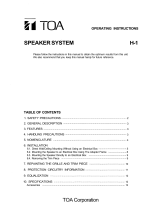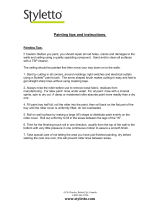*
1
Continuous 24 hours, band-limited pink noise (50 to 20,000 Hz)
*
2
Pink noise (1,000 Hz to 10,000 Hz)
Note: The design and specifications are subject to change without notice for improvement.
• Accessories
Adapter Panel ......................................... 1
Pattern paper .......................................... 1
Speaker mounting screw
M4 x 25 (with spring washer and
plain washer) ...................................... 4
Electrical box mounting screw
M4 x 25 ............................................... 4
UNC No. 8-32 x 32 mm ....................... 4
Spring washer ..................................... 4
Plain washer ....................................... 4
Enclosure Type Sealed type
Power Handling 90 W (continuous program input, 4 Ω loaded)
30 W (continuous pink noise input, 4 Ω loaded)*1
Rated Input 12 W (16 Ω or high impedance)
Rated Impedance 4 Ω, 16 Ω
70 V line: 0420 Ω (12 W), 830 Ω (6 W), 1.7 kΩ (3 W), 3.3 kΩ (1.5 W)
100 V line: 830 Ω (12 W), 1.7 kΩ (6 W), 3.3 kΩ (3 W)
Sensitivity 85 dB (1 W, 1m, 2 π loading)*2
Frequency Response 120 Hz to 20 kHz (–10 dB, 2 π loading)
Crossover Frequency 5,000 Hz
Speaker Component Low frequency: 8 cm x 5 cm cone woofer
High frequency: Balanced dome tweeter
Input Terminal Detachable screw terminal, (+)/(-) 2 each (for bridging connection)
Usable Cable Solid cable or stranded cable: 0.2 mm2 – 2.5 mm2 (Corresponding to
AWG No. 24 – 14)
Finish Enclosure: Fire-resistant ABS resin (UL 94V-0), black
Trim Piece: Fire-resistant ABS resin (UL 94V-0), white, paint
Grille: Rolled steel plate, white, paint
Adapter Panel: Stainless steel
Dimensions 312 (w) x 126 (h) x 90 (d) mm
Weight 1.5 kg (including Adapter Panel)
9. SPECIFICATIONS
533-06-075-1B
URL: http://www.toa.jp/
Traceability Information for Europe
Manufacturer:
TOA Corporation
7-2-1, Minatojima-Nakamachi, Chuo-ku, Kobe, Hyogo,
Japan
Authorized representative:
TOA Electronics Europe GmbH
Suederstrasse 282, 20537 Hamburg,
Germany













